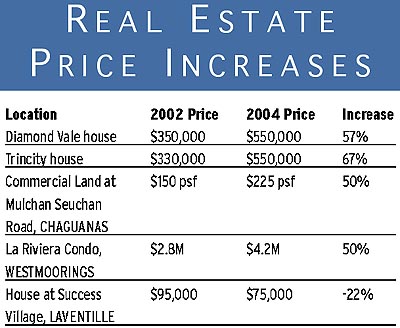| The property ‘bubble’ — Part 1
Published
Thursday 22nd April, 2004
The people who actually produce the properties are themselves
having their behaviour changed by the new environment in terms of the
appraisal they make before investing in a project.

For several weeks, workmen have been busy at the
Deluxe Cinema site located at the corner of Pembroke and Keate
street. No one can confirm exactly what is going to be built there,
but entrepreneur Johnny Soong has been seen there on several
occasions. Word around town is that a new entertainment centre will
replace the old cinema. Photo: Karla Ramoo

This week we move onto the main topic in the minds and mouths of
those of us in the property business. The Business Guardian’s Editor has
called this the property “bubble” and some of the main questions
investors and owners are asking are — For how long can property prices
keep rising this way? Are we about to experience a crash? For those
outside the circle of property owners, the questions are more pained —
With the other increases in the cost of living, will our wages ever
allow us to save a deposit for a home? Will we ever be able to afford
our own homes? Do we have to pay rent forever?
Let us say right away that it is impossible to answer any of those
questions for certain in this column, but this week we will start to
discuss some of the main features of this stage of the property market.
One could well ask whether all good things must come to an end. But it
is also interesting to consider whether these steep price increases are
really a good thing..
These would need to include —
What is the market? — Many of the calls for an explanation of
this extremely dynamic market seem to be based on a “western peninsula
perspective,” but it has never been the intention of this column to
focus so narrowly on such an important market. The property market and
the price movements in it affect all of us in this small country. Either
as homeowners and hopeful homeowners or as business people who have to
pay rent and people who want to open businesses, we are all “in the same
boat.” If the scarce resources of the construction industry are engaged
in building large projects — such as those by UDeCOTT, NIPDEC, HCL and
our other property developers — there will be increased costs to those
undertaking other projects, such as the building of their own homes.
These would include the emergence of less competent contractors, the
present increases in material costs and the logjam in the approval
process. The same principle applies to the scarce resource of land.
Central Bank Monetary Policy Report — The Governor of the
Central Bank recently briefed us on the implications of the present high
levels of liquidity and depressed interest rates in the shape of
property emerging as a preferred investment. The Governor went on to say
that the consequent property price increases are limited to a few areas
only. Our own view is different, as there seems to be widespread
inflation in property prices.
National Increases — As a matter of fact, we do not have the
facts available, in terms of either quantity or quality, to really
construct any kind of index for house prices. Our own attempts in that
direction are private but it would seem that property prices have risen
by over 30 per cent in the last two years or so.
Limited areas with no growth — In making that kind of estimate
one also has to note that only a few limited areas, perhaps six or so,
have experienced no price increases in the last two years.
Vendor/Purchaser behaviour — In this inflationary climate,
both sides in transactions are exhibiting behaviour, which is not
justifiable by the usual yardstick. Purchasers are paying more than a
property is worth, in the belief that today’s overpayment can be
eclipsed by tomorrow’s price increase. Vendors are dominant in this
sellers’ market so they can “call their price” and wait for the right
purchaser. Both sides are making long-term financial decisions on the
basis of future price increases. So far events have justified this
pattern of investment.
Supply-side implications — The people who actually produce the
properties are themselves having their behaviour changed by the new
environment in terms of the appraisal they make before investing in a
project. The project appraisal process would ordinarily involve
analysing a proposal in both pessimistic and optimistic modes — to
establish the best and worst case scenarios. The behaviour of purchasers
and vendors outlined above can result in developers embracing the
optimistic scenarios as a matter of routine. So far so good, but when we
consider the cost increases in the construction sector and other
factors, the risk of mistakes is high.
Next week, we will examine some of the changes, which will affect
the property market in the medium-term, foreseeable future.
|

